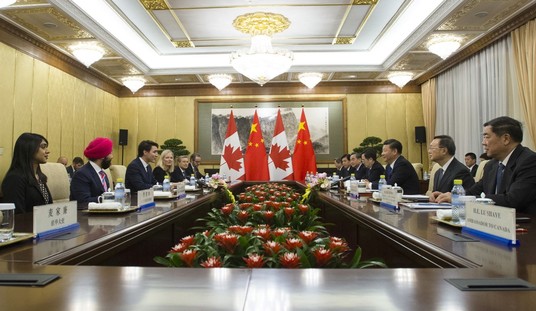Soccer haters, you’ve had your fun. You’ve mocked kicky ball, you’ve said it’s socialist, you’ve tarred it as communist. You’ve bragged that you don’t know anything about soccer, and that you don’t want to know anything about soccer, and you’ve smeared anyone who does know anything about soccer as either a socialist, a communist, or a pantywaist.
Tell that to Tim Howard. If you have the guts.
So here’s the deal. Soccer is not only not any of the things that you haters claim, it’s actually much more of a capitalist sport than you realize. Because you don’t know anything about it. Here are five reasons that soccer is actually capitalist and ruthlessly American.
1. Soccer rewards success and punishes failure ruthlessly.
The NFL, NBA, NHL and MLB are mostly static leagues. Regardless of their win-loss records, the leagues keep the same teams around year in and year out. Franchises like the Detroit Lions become embarrassments that go on for years on end, yet they are never booted out of the NFL. Loser teams stick around in all of the US top sports leagues. That’s also true of US Major League Soccer. Teams move from town to town every once in a while, but they’re still the same team nearly all the time. Even if they get a new name.
But in the world’s soccer leagues, if you suck, you get kicked out of the league. And if you’re good and finish at the top of your league and you’re in a league that’s lower than the top league, you get promoted up to the big league. Of the 20 teams that make up England’s Premiere League every year, three have been promoted because of their accomplishments in the second-tier Championship League the season before. And the worst three Premiere League teams got relegated down to that second-tier league. If they want to get back to the top league, they have to earn it by finishing high enough to either earn automatic promotion or go into a playoff to earn it. Any EPL team can get relegated if they have a bad enough season. The same is true for leagues all across Europe, wherever there are enough teams to have multiple leagues with tiered systems.
One year of suckitude and you and your club get sent down to a lower league. That’s hard core. US sports could learn a thing or two from the creative churn of soccer’s relegation-promotion system.
And by the way, a good player in a lower league team can find himself scooped up directly into a top team in a top league if his play is good enough. It’s all about how well he plays as an individual. If you shine even on a horrible team, you’ll move to a good team.
2. Soccer games are often decided not by a collective team effort, but by moments of individual brilliance.
US goalkeeper Tim Howard (pictured above, with more arms that he may actually have) kept the US in its match versus Belgium with a singular individual performance. He made 16 saves, a World Cup record. Without Howard’s Alamo act, the US would’ve gotten hammered. Leo Messi of Argentina has decided group stage matches on his own, when the rest of his team basically took the day off. Mexico goalie Guillermo Ochoa kept Mexico in its match versus offensive juggernaut Brazil, when his defense acted like they were making a run to the beach. France’s Olivier Giroud played both ends of the game versus Switzerland, defending like a beast when he had to, and setting up shots and scoring when he had to, too. Belgium’s Romelu Lukaku basically decided the match versus the US when he shrugged off a US defender like a linebacker throwing flankers around.
Captain America Clint Dempsey played most of this year’s World Cup with a broken nose. He didn’t armor up like they do in football. He just kept playing and being a beast.
I’m not saying that teams aren’t important. They are very important in soccer. But in most other sports, it’s rare for one player to take over a game and win it single-handedly. It does happen — QB Vince Young more or less won the NCAA football championship on his own for the Texas Longhorns. He just decided that he would not be beat. But he still needed the line to block and a receiver to at least fake a throw to once in a while. Messi can and does carry teams at the club and international level, and can turn everything around with one flash of inspiration.
In soccer, teams matter but individual brilliance often settles the score. That’s so much the case that every year soccer awards a big gold soccer ball to the world’s best player. This past year that went to Portugal’s Cristiano Ronaldo. He failed to show his individual brilliance in the World Cup this year, though, and got rewarded with an early exit.
But, who wouldn’t want a big, gold soccer ball? You could melt it down and sell it off when the dollar finally crashes.
3. Soccer is to sports what Edison was to inventions.
In the previous point I mentioned the flash of individual inspiration that can settle a game. Thomas Edison, the great American inventor, said that invention is 1% inspiration, 99% perspiration. That’s how soccer often is. Basketball is totally different. Both teams score 50 times a game in basketball. Most games have their share of flashy moments, to the point that they’re never special. Julian Green’s goal for the United States versus Belgium in stoppage time was special. It was that flash of inspiration from both Green and Michael Bradley, after more than an hour of frustrating perspiration. It was memorable in ways that any of the 10 or 15 dunks and alley-oops in basketball aren’t.
Lower scoring games like football and baseball usually either need a team effort to settle things — the QB bomb to the WR as the clock runs out — or a bit of luck, like the grand slam in the bottom of the ninth, which mainly happened because the pitcher chose the wrong pitch at the wrong time.
What’s more American than Thomas Edison?
4. They literally buy and sell players.
In other sports, they trade players or pick them up on free agency. That happens in soccer too, but most of the time, players move because their current club literally sells them to another club. The clubs are buying and selling contracts, of course, not actual human beings. But that’s how business is done. Team A has a player that Team B wants, so Team B offers Team A $10 million or whatever they think the player is worth. Cash money. The teams haggle like they’re on a car lot, the player’s agent gets involved to settle salary and other personal issues, and then the deal is done. It’s pure capitalism. You have something that I want, so I make you an offer and we work out a cash deal.
Soccer teams also tend to be more capitalistic on their facilities. They usually own their stadiums, and usually don’t get government to subsidize new stadiums or upgrades. The clubs finance it themselves. They also don’t threaten their local cities that they’ll move if the taxpayers don’t fork over a stack of cash for new grounds. That sort of blackmail just doesn’t work in soccer.
5. Do you know who owns many of Europe’s top soccer teams? Americans, that’s who.
Soccer is now an American sport. There are an estimated 12 million soccer fans in the US. That’s more fans than many countries have in total population. Not all of America’s soccer fans are hipster toolbags who hang out at the coffee shop. Some of them are gut-busting billionaire capitalists who are building empires.
England’s Premiere League is the most watched sports league in the world. By some distance. One of its top teams, Manchester City, is owned by an oil sheikh. Another, Chelsea, is owned by a Russian oligarch. But after that, most of the EPL’s top teams are American owned.
American Stan Kroenke owns Arsenal. He also owns the St. Louis Rams (NFL), the Colorado Avalanche (NHL) and the Colorado Rapids (MLS).
The Fenway Sports Group, owners of the Boston Red Sox, own Liverpool.
The Glazer family owns Manchester United. They’re Americans. They trade their English soccer team on the New York Stock Exchange.
Aston Villa aren’t a big team, but they’re owned by American Randolph Lerner.
Sunderland are owned by American Ellis Short.
An American also owns Fulham, which was ruthlessly kicked out of the Premiere League after 11 years in the top flight. Because they sucked, and the Premiere League ain’t got time for that.
England invented soccer. They call it football. We changed the name to soccer because we felt like it. We still call it soccer, and we don’t care what the rest of the world thinks about that. Nor should we.
This year’s World Cup saw the nation that owns several of England’s top teams last longer at their game than the English did.
Tim Howard and America got to the round of 16.
England got kicked out at the group stage. Because they sucked, and the World Cup ain’t got time for that.










Join the conversation as a VIP Member